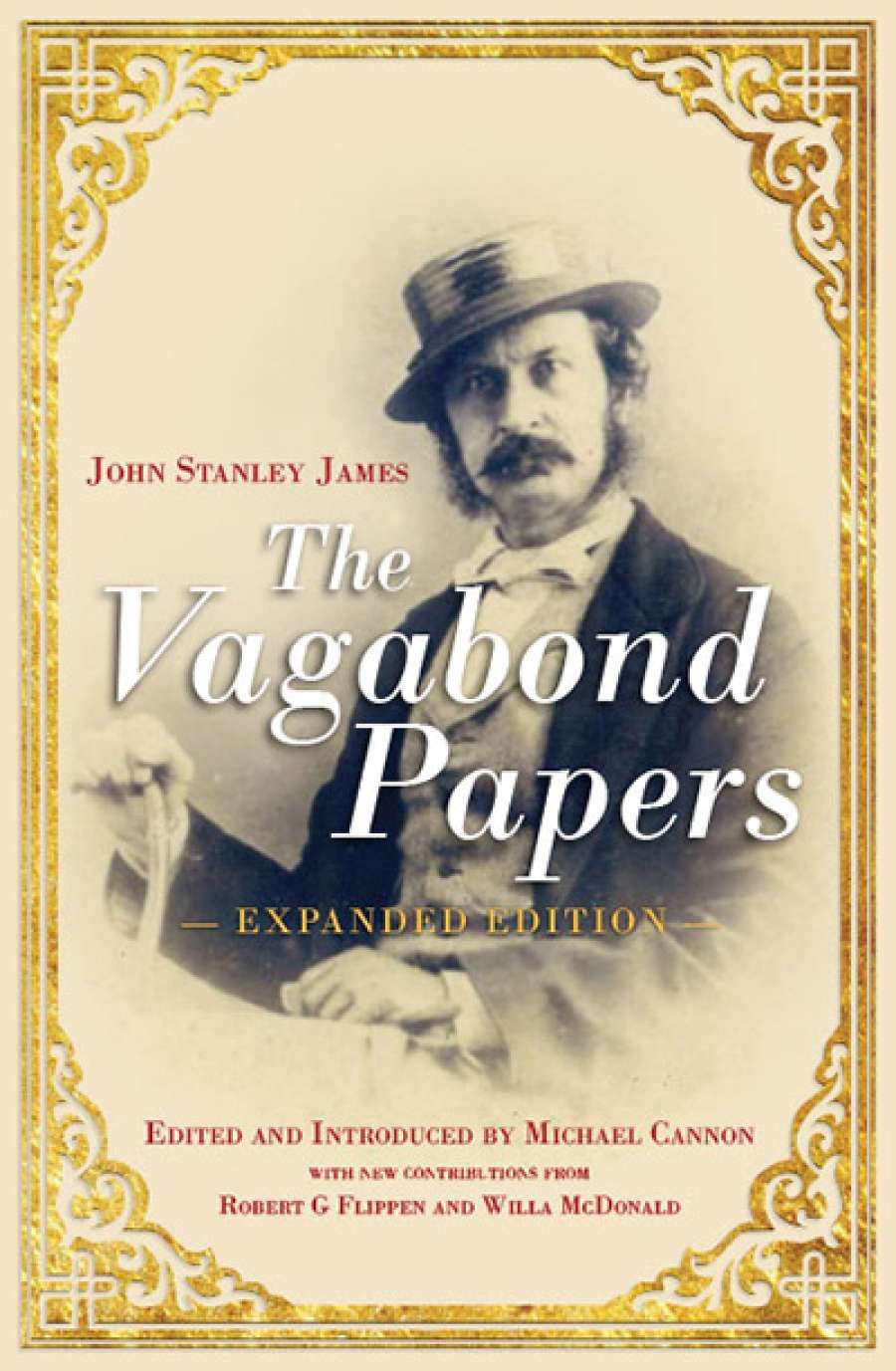
- Free Article: No
- Contents Category: Australian History
- Custom Article Title: John Arnold reviews 'The Vagabond Papers' by John Stanley James
- Custom Highlight Text:
In March 2016 the Royal Historical Society of Victoria hosted a function to mark the fiftieth anniversary of the publication of Michael Cannon's The Land Boomers, first issued ...
- Book 1 Title: The Vagabond Papers
- Book 1 Biblio: Monash University Publishing $34.95 pb, 332 pp, 9781922235985
Cannon's books on colonial Victoria include two edited collections of the journalism of John Stanley James, known as 'The Vagabond', extracted from the four volumes of The Vagabond Papers published in Melbourne in the 1870s. The first of Cannon's selections dealt with urban life in Melbourne and Sydney, the second with James's writings on life in country towns and the bush. This new edition of The Vagabond Papers effectively reprints the text of the first one with some minor rearrangement, and includes a new introduction by Cannon, an account of James's time in America by Robert G. Flippen and 'The Vagabond in New Caledonia' by Willa McDonald.
James's life was an interesting but elusive one. As Cannon notes in his new introduction, James was 'always skipping from one hot spot to the next, pretending ... to be someone else'. Born in Wolverhampton in 1843, he was turned out of the family home after running away from school following victimisation. After a period as a wandering vagrant, he moved to London and eked out a precarious living as a freelance journalist. He went to Paris in 1870 to report on the Franco-German war, but was arrested as a spy for his support of the revolutionaries plotting to overthrow Napoleon III. Around 1873 he sailed for New York. When researching James's life for the 1969 edition of The Vagabond Papers, Cannon drew a virtual blank on his time in America, and had to rely on the regular hints – not always true – that James provided in his journalism on his background.
The section in this new edition by Flippen fills in the gaps. James was in Framville Virginia by the mid-1870s, cultivating the image of a man of letters and being known as 'Dr J.S. Stanley-James'. He gave public lectures, was a director of a local bank, married a widow, and built a large house for his wife and her children from a former marriage, probably paid for with her money.
James got into financial difficulties by foolishly agreeing to honour what turned out to be worthless securities. As a result, his high standing in the local community was ruined, and in 1875 James simply upped and left, leaving his wife and friends without any forwarding address. He fetched up in Melbourne as 'Julian Thomas' and was soon writing regular descriptive pieces on life in the city as 'The Vagabond' for the Argus. His middle-class readers lapped up everything he wrote. But James was not writing to titillate his readers in the same sense that some people today are fascinated by the activities of Mick Gatto and his ilk. He wrote with sympathy and insight about the lives of ordinary people, especially those at the lower ends of the social scale. Such was his standing that when he decided to move to Sydney to write for the Sydney Morning Herald he was presented at a testimonial dinner with a purse of 308 sovereigns.
From Sydney he went to New Caledonia to report on the suppression of a convict rebellion. His time there is detailed here with some revealing insights in McDonald's essay. James later investigated the Kanaka trade and published an account of his Pacific experiences as Cannibals & Convicts: Notes of personal experiences in the Western Pacific (1886).
 John Stanley James (photograph by J. Brown, National Library of Australia)James returned to Victoria in the 1880s and was allegedly earning six to nine pounds a week from his journalism. But he was a poor money manager. He suffered badly from asthma and died in poverty in a squalid single room in Fitzroy in 1896, aged fifty-three. But he had not been forgotten. The hundreds of wreaths at his funeral included one from the Neglected Children's Society and another from philanthropist Lady Jane Clark.
John Stanley James (photograph by J. Brown, National Library of Australia)James returned to Victoria in the 1880s and was allegedly earning six to nine pounds a week from his journalism. But he was a poor money manager. He suffered badly from asthma and died in poverty in a squalid single room in Fitzroy in 1896, aged fifty-three. But he had not been forgotten. The hundreds of wreaths at his funeral included one from the Neglected Children's Society and another from philanthropist Lady Jane Clark.
Although he also wrote about the middle class and sport – there is a very good piece on a Melbourne game of Australian Rules football – what was special about James's journalism was his writings about the life of outcasts and down and outs, the 'slum journalism' pioneered in Australia by Marcus Clarke. James's unique contribution to this genre was that he took it one step further than Clarke: he wrote both as an observer and as an active participant. He would spend a night in jail and a few days in the Benevolent Asylum; he worked as an assistant at Pentridge, and ate at sixpenny restaurants. He would talk and mix with the inhabitants and frequenters of these institutions, and then write up his experiences.
The writing name adopted by John Stanley James/Julian Thomas for this observatory and participatory journalism was a most appropriate one. James was a perceptive wanderer: a shrewd and observant vagabond. This reissue with the new information on his life in Virginia and his time in New Caledonia is both a good read and a valuable source on ordinary life in Melbourne and Sydney in the second half of the nineteenth century.


Comments powered by CComment